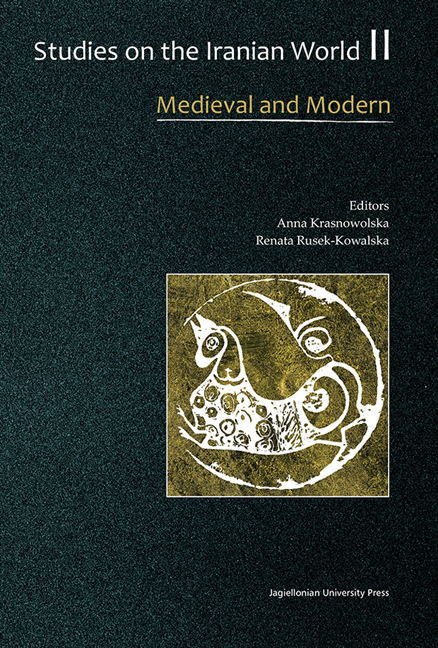Book contents
- Frontmatter
- Contents
- Foreword
- Linguistics
- Literature
- Timurid Authority and the Ottoman Sultan: Some Notes on Three Jāmi Manuscripts from the Library of Bayezid II (886–918/1481–1512)
- The Historical Novel in Early Modern Persian Literature
- Sibā-Zeynab-Zibā: the Metamorphoses of an Iranian Woman
- Laughing at Adultery in Persian Literature and Culture
- Quiet Lives and Looming Horrors – Subversive Narrative Strategies in the Earliest Short Stories of Zōyā Pīrzād
- Religion
- History
- Arts
- Social and Cultural Studies
Sibā-Zeynab-Zibā: the Metamorphoses of an Iranian Woman
from Literature
Published online by Cambridge University Press: 12 January 2018
- Frontmatter
- Contents
- Foreword
- Linguistics
- Literature
- Timurid Authority and the Ottoman Sultan: Some Notes on Three Jāmi Manuscripts from the Library of Bayezid II (886–918/1481–1512)
- The Historical Novel in Early Modern Persian Literature
- Sibā-Zeynab-Zibā: the Metamorphoses of an Iranian Woman
- Laughing at Adultery in Persian Literature and Culture
- Quiet Lives and Looming Horrors – Subversive Narrative Strategies in the Earliest Short Stories of Zōyā Pīrzād
- Religion
- History
- Arts
- Social and Cultural Studies
Summary
SUMMARY
Zibā Nāvak's three-volume autobiography provides not only an alternative account of the Islamic Revolution but also offers a fascinating counter-narrative of post-revolutionary prison experience. Once a communist revolutionary, a repentant prisoner (tavvāb) and a fanatical supporter of Xomeyni, who eventually became a liberated blogger, Nāvak makes an attempt to construct a coherent narrative identity of her multiple selves. To achieve it, she resorts to the rhetoric of sincerity, metaphorical figures and the literary patterns of a mystical quest which are dominant in Persian literature and in which an apparent fall might prove an indispensable stage of spiritual progress.
It hardly needs to be said that Iran underwent dramatic political and social changes during the second half of the 20th century. The rapid modernization and westernization of the country resulted in the anti-monarchial and anti- Western revolution that turned the country upside down and led to the creation of the Islamic Republic. The intense ideological ferment which accompanied these political changes constantly undermined the dominant values, which undeniably influenced the question of personal identity and inevitably re-shaped many ‘selves’.
Most vulnerable to the changes was undoubtedly the generation who reached adulthood at the outbreak of the revolution and became its main victim. Those ‘children of the revolution’ who survived it, the war which followed and the oppressions of the 1980s, have been slowly recovering from their traumas and trying to retell them. Post-traumatic testimonies constitute an essential part of the recovery process, an attempt to ‘read oneself in the text’ and make oneself ‘a subject of one's own understanding’ (de Man, Anderson), as well as an effort to renegotiate one's identity with the world. These take various forms, ranging from what are generally perceived as more fictional novels and short stories4 to more intimate memoirs5 and autobiographies, a genre which has been rather under-represented in Persian literature so far and is commonly rejected as being inappropriate in a culture which strictly divides the world into public and private spheres (biruni and andaruni). This conservative attitude towards self-narration in Persian culture particularly applies to women, who, traditionally, were expected to practice self-concealment, hiding themselves behind veils, being proud of their inaccessibility and remembering that ‘self-representation may turn into self-destruction.’
- Type
- Chapter
- Information
- Studies on the Iranian WorldMedieval and Modern, pp. 81 - 98Publisher: Jagiellonian University PressPrint publication year: 2015



